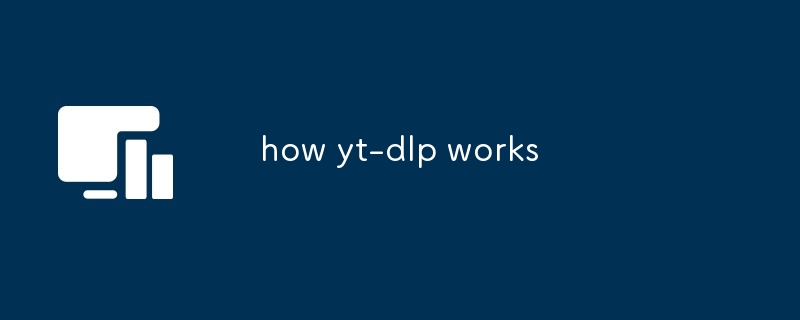Home >Software Tutorial >Computer Software >how yt-dlp works
how yt-dlp works
- DDDOriginal
- 2024-08-19 11:59:311150browse
yt-dlp, a command-line tool, utilizes HTTP requests, stream analysis, and a variety of formats to download videos from websites like YouTube. It supports different formats and quality levels, ensuring flexibility. Security measures include HTTPS supp

How yt-dlp works
yt-dlp is a command-line program that allows users to download videos from a wide variety of websites, including YouTube, Facebook, and Vimeo. It works by using a combination of techniques, including:
- HTTP requests: yt-dlp sends HTTP requests to the target website to get information about the video, such as its URL, title, and format.
- Video stream analysis: yt-dlp analyzes the video stream to determine its format and quality level.
- Downloading: yt-dlp downloads the video stream to a file on the user's computer.
What are the technical mechanisms that enable yt-dlp to download videos from websites?
yt-dlp uses a variety of technical mechanisms to download videos from websites, including:
- HTTP requests: yt-dlp sends HTTP requests to the target website to get information about the video, such as its URL, title, and format.
- Video stream analysis: yt-dlp analyzes the video stream to determine its format and quality level.
- Downloading: yt-dlp downloads the video stream to a file on the user's computer.
How does yt-dlp handle different video formats and quality levels?
yt-dlp can handle a wide variety of video formats, including MP4, FLV, and WebM. It can also download videos in different quality levels, from low quality to high quality.
To specify the desired video format and quality level, users can use the --format and --quality options. For example, to download a video in MP4 format with a quality level of "best", users can use the following command:
<code>yt-dlp --format mp4 --quality best</code>
What security measures are in place to protect users and safeguard their privacy while using yt-dlp?
yt-dlp includes a number of security measures to protect users and safeguard their privacy, including:
- HTTPS support: yt-dlp supports HTTPS connections, which encrypt data sent between the user's computer and the target website.
- Cookie support: yt-dlp supports cookies, which allow users to log in to websites and access private content.
- User agent spoofing: yt-dlp can spoof its user agent, which makes it appear to be a different browser or device. This can help users bypass website restrictions and download videos that would otherwise be unavailable.
The above is the detailed content of how yt-dlp works. For more information, please follow other related articles on the PHP Chinese website!

